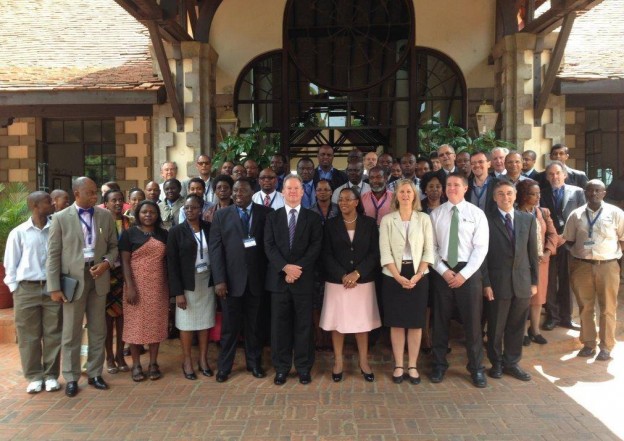Australia and Africa to work together on plant biosecurity
PRESS RELEASE
29 October 2014
A cadre of ‘change champions’ are to be trained to improve plant biosecurity in ten east and southern African countries.
Plant biosecurity specialists in national plant protection organisations, and in trade and private sector organisations have identified plant biosecurity training needs for ten African countries. Matched training in Australia will follow, with the resulting ‘biosecurity change champions’ working to improve regional biosecurity to impact farmer incomes, food security and safe regional trade of agricultural products.
The Australia-Africa Plant Biosecurity Partnership held a workshop on 27-28 October in Nairobi that has pinpointed key areas where Australian expertise can strengthen African biosecurity. East and southern African countries that are included at this stage are Burundi, Ethiopia, Kenya, Malawi, Mozambique, Rwanda, Uganda, Tanzania, Zambia and Zimbabwe. Read the workshop communique.
“Individuals from the ten targeted countries will be initially trained through placements in Australia and other activities. They will also be tasked to manage training and outreach in their own countries and become ‘change champions’ to encourage their governments and agencies to take up the challenge of improving their country’s biosecurity systems, policies and resources,” said Dr Michael Robinson, CEO of Australia’s Plant Biosecurity Cooperative Research Centre (PBCRC).
“As an island nation, Australia knows only too well the significant impact that pests and diseases can have on plant industries and trade. In addition to the training in Australia, we expect that the African Biosecurity Fellows will receive ongoing mentoring and the creation of a regional alumni to promote harmonised biosecurity measures in the region,” said Ms Melissa Wood, Director, Australian International Food Security Research Centre (AIFSRC) within the Australian Centre for International Agricultural Research (ACIAR).
“We welcome the addition of AU$400,000 pa for up to three years announced by the Australian High Commissioner Geoff Tooth at the workshop opening as it will enable us to spread the impact of the initial funding of AU$1 million.”
“We also hope to leverage support from African agencies to complement and support the work of the returned Fellows,” she said.
A speech at the workshop by Mr Felix Koskei, Cabinet Secretary Ministry of Agriculture, Livestock and Fisheries, Kenya noted that “Shortfalls in biosecurity capacity can be an issue for individual smallholders, research organisations and agencies, but lack of biosecurity capacity is often a problem in development.”
Dr Dennis Rangi, Executive Director of CAB International (CABI) - which will be responsible for the delivery of the project in Africa - said “I see this initiative as unique as it has made the effort to have Africans identify capacity gaps before any decisions have been made to implement the project, and it is bringing our public and private sectors together in a cooperative environment on biosecurity. The workshop itself has started this process.”
The main areas identified by workshop participants as needing biosecurity capacity development are:
- diagnostic skills for identification of key pests and diseases of concern
- risk analysis and risk management with a focus on seed and live planting material
- emergency response and eradication
- surveillance and management of key pests and diseases affecting production and trade
- early warning and biosecurity planning, and
- listing and prioritisation of key pests and diseases on traded commodities, to reduce biosecurity constraints to imports and exports.
Training in skills to assist the Fellows as change agents was also supported.
The Australia-Africa Plant Biosecurity Partnership is led by Australia’s PBCRC and funded by the AIFSRC within ACIAR, CABI and the Australia Awards scholarship program. The program is being delivered by a consortium of PBCRC, ACIAR, CABI, CSIRO and the Crawford Fund.
More information and the full text of the workshop communiqué will be available at www.pbcrc.com.au/research/east-africa
In Australia: Tony Steeper, PBCRC Communications Manager, 0417 697 470, [email protected]
In Kenya/Africa: Cathy Reade, Director, Public Affairs and Communication, The Crawford Fund +61 413 575 934 [email protected]
In UK: Rachel Winks, PR and Social Media Manager, CABI, +44 (0)1491 832111 [email protected]

